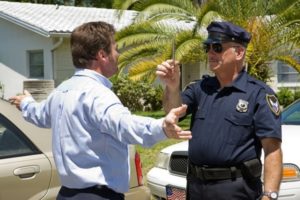
Standardized field sobriety tests refer to a group of tools that police officers use to determine if there is reason to believe that a driver is under the influence of alcohol. If you agree to take field sobriety tests and the police officer believes you show cues of impairment, they will then ask you to take a breath test to confirm their suspicions. Under New Mexico law, you do not need to submit to an officer’s request to take field sobriety tests. That said, if you refuse the standardized field sobriety tests, the officer may request you take a breath test, which is not optional.
Types of Field Sobriety Testing Used by New Mexico Police
There are three types of New Mexico standardized field sobriety tests. Police officers use these tests to assess whether there is probable cause to arrest a driver for a New Mexico DWI offense.
The Horizontal Gaze Nystagmus Test
Horizontal gaze nystagmus refers to small, involuntary jerking movements the eyes make when tracking an object from side to side. The horizontal gaze nystagmus (HGN) test involves a police officer slowly moving a pen or flashlight from one side of the driver’s face to the other. The officer will ask the driver to follow the object with their eyes, watching for signs of impairment. Specifically, a police officer will look for the following:
- The driver’s inability to smoothly track the object;
- At what angle of vision the driver’s eyes begin to jerk; and
- Whether the jerking movements are distinct and sustained when the object is placed at the far end of the driver’s sight.
One study indicated that if a driver exhibits four or more signs of intoxication between both eyes, they are likely to have a blood-alcohol content of .08 or greater.
The Walk-and-Turn Test
The walk-and-turn test involves an officer’s request for a driver to take nine steps, turn around, and then take nine steps to return to their original position. The officer will instruct the driver that the steps should be heel-to-toe. An officer will watch for several signs of intoxication, including:
- If the driver stumbles or loses their balance;
- If the driver takes the incorrect number of steps;
- If the driver starts before being told to do so;
- If the driver cannot walk in a straight line;
- If the driver stops to regain their balance;
- If the driver holds out their arms to keep their balance; and
- If the driver fails to turn around as instructed.
According to one study, 79% of drivers who show two or more signs of intoxication were intoxicated.
The One-Legged Stand Test
The one-legged stand test involves a police officer asking a driver to stand with one leg approximately six inches off the ground while counting out loud. The officer will stop the driver after 30 seconds, keeping an eye out for signs of intoxication, which include:
- Swaying from side to side;
- Holding out their arms to maintain balance;
- Hopping to keep their balance; and
- Putting their raised foot down before told to do so.
According to a study from 1998, 83% of drivers who showed two or more signs of intoxication during the one-legged stand test were intoxicated.
While the standardized field sobriety tests are designed to detect signs of intoxication in the general population, they are not perfect. Moreover, officers must undergo special training to correctly interpret the results of field sobriety tests.
Are There Defenses to Field Sobriety Tests?
Field sobriety tests are not an accurate assessment of a driver’s potential intoxication in all cases. For example, if a driver is taking prescription medication or suffers from certain medical conditions, it can affect their ability to perform these tests. Thus, police officers should ask drivers if they are taking any medicine or have any medical conditions that may affect their balance before ordering the driver to take a standardized field sobriety test. However, often police officers fail to do so. Heavier drivers, as well as those who suffer from anxiety, may also perform poorly on field sobriety tests unrelated to any potential intoxication.
Police officers are also supposed to inform motorists that they are not required to take field sobriety tests. Again, many police officers do not mention this when they request a motorist take the tests, leading the driver to believe they have no choice. And in some cases, a police officer may conduct field sobriety testing without having ever been through the necessary training.
In each of these cases, the results of field sobriety tests may be suspect. To the extent that an officer’s request for a breath test is premised on the results of a questionable field sobriety test, the result of the breath test may not be admissible at trial. There may also be other defenses available to those facing New Mexico DUI charges.
Are You Facing New Mexico Drunk Driving Charges?
If you were recently arrested and charged with a New Mexico DUI offense, the dedicated criminal charges defense legal team at the New Mexico Criminal Law Offices is here to help. Our attorneys possess an impressive understanding of the laws governing police officers’ actions during traffic stops and put this knowledge to use in each of our clients’ cases. We are often able to successfully challenge the admission of breath and blood test results, resulting in the withdrawal of charges. To learn more and to schedule a free case evaluation with our experienced New Mexico criminal charges defense legal team, give us a call or reach out to us through our online form.

